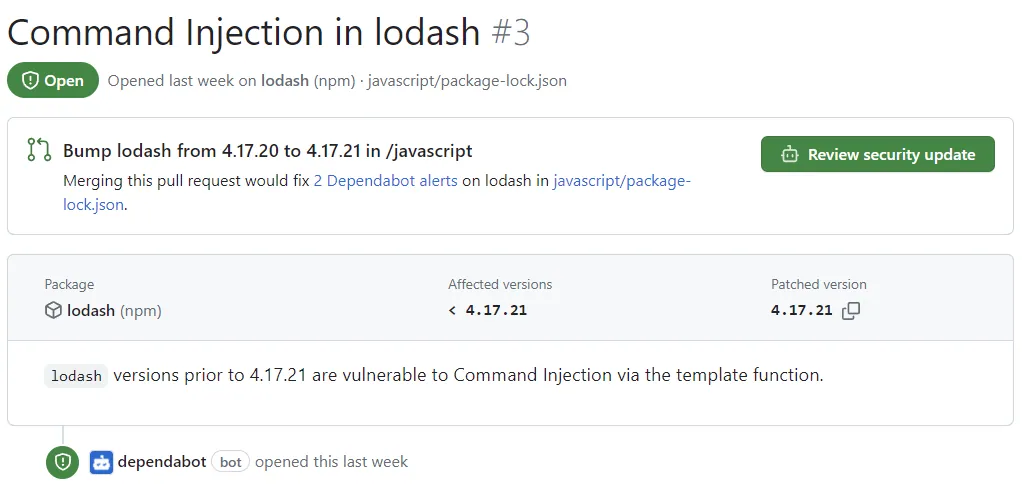
Security might not be the first thing on your mind, but every time you npm install, pip install, or cargo add, you’re trusting third-party code. That’s normal and necessary, but outdated or vulnerable dependencies can introduce security issues you might not even know about.
That’s where Dependabot comes in.
Dependabot checks your dependencies for known vulnerabilities and automatically opens pull requests to suggest updates. Think of it as a security-focused teammate who never sleeps and is always looking for the latest patches.
You can even combine Dependabot with Copilot Chat to run dependency audits interactively, but let’s not jump the gun!
🚀 Get started with Dependabot in 5 minutes
New to Dependabot? No worries! The Dependabot quickstart guide provides a safe demo environment, so you can confidently learn and explore without affecting your repository.
Here's how easy it is to get started:
Step 1: Fork the demo repository
- Visit https://github.com/dependabot/demo.
- Click Fork in the top-right corner.
- Select your GitHub account, enter a repository name, and click Create fork.
Step 2: Enable Dependabot
- Navigate to your forked repository on GitHub.
- Click Settings under your repository name.
- In the sidebar, select Code Security.
- Click Enable for Dependabot alerts, Dependabot security updates, and Dependabot version updates.
Step 3: View your alerts
- On your repository page, click the Security tab.
- Select Dependabot under the "Vulnerability alerts" sidebar section.
Once enabled, Dependabot will start returning results, and you’ll be able to see what a real, live dependency vulnerability looks like—as well as how Dependabot can help you remediate it.
(Here’s a sneak peek.)

To see the real deal, keep following along in the Dependabot quickstart guide. You’ll learn how to view Dependabot alerts and how to fix or dismiss them.
🧱 Level up your security
🎥 Watch: Video: How to run dependency audits with GitHub Copilot provides a two‑minute demo showing how you can automate dependency management using GitHub Copilot, GitHub Actions, and Dependabot.
🔒 Read: How we’re making security easier for the average developer teaches you how to write more secure code on GitHub, with GitHub Secret Protection, GitHub Code Security, Dependabot, and Copilot Autofix—all in fewer than 10 minutes.
🧠 Pro tip: Audit your dependencies with Copilot Chat
If you’re using GitHub Copilot Chat, try this prompt in your project:
“Do any of my dependencies have known vulnerabilities?”
Copilot will walk you through what it finds—you can even ask follow-up questions or request an upgrade recommendation. It’s a fast way to combine code insight with security scanning, right in the editor.
🔐 One small step for setup, one giant leap for security
Dependabot is a low-effort, high-impact way to keep your projects secure and healthy. Whether you’re building a personal side project or maintaining enterprise code, setting it up takes just a few minutes—well worth the peace of mind.
You don’t need to be a security expert to ship secure code. You just need the right tools, and GitHub has your back.
✨ This newsletter was written by Mike Melanson and produced by Gwen Davis. ✨
More to explore 🌎
Join our GitHub security conversations 🤖
Visit our community forum to see what people are saying + offer your own two cents.
Stay updated on GitHub products 📦
Discover the latest ships, launches, and improvements in our Changelog.
Subscribe to our LinkedIn newsletter 🚀
Do your best work on GitHub. Subscribe to our LinkedIn newsletter, Branching Out_.

